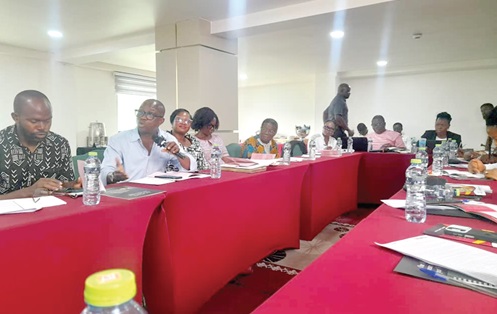
Programme to empower activists to speak out underway in Accra
A programme to train individuals and groups on how to resist harassment and legal suits brought against them in the course of their work is underway in Accra.
The two-day event which is being attended by participants form Ghana, Sierra Leone, Liberia, Nigeria and South Africa, is also to empower them as activists to speak out on matters of public interest.
The programme is being organised by Southern Africa Resource Watch (SARW), in collaboration with Third World Network (TWN) - Africa and Trust Africa, and is on the theme:
“Defending the defenders: Empowering environmental justice and artisanal mining.” Participants include activists, whistle-blowers, rights’ defenders, lawyers, watchdog civil society organisations and journalists.
They would share experiences about how they dealt with different lawsuits brought against them by corporations and groups intended to censor, intimidate and silence them for fighting on issues such as environmental degradation caused by mining and oil production activities.
They are also being taken through strategic lawsuit against public participation (SLAPP). Such suits are usually initiated by powerful groups and corporations against individuals and entities to dissuade them from continuing to produce negative stories about them.
It includes censorship, litigation, legal harassment, fear tactics and suppression. SLAPP suits temporarily prevent critics from making public statements against their targets or, more commonly, make critics spend all their time and resources defending the suits.
Silencing people
The Coordinator of TWN-Africa, Dr Yao Graham, said in West Africa, including, Ghana, there was significant use of the criminal justice system to try and silence people.
In the context of Ghana, he explained that the police, in particular, use parts of the criminal justice system to harass people, citing the abuse of the electronic communication law and locking up of people in police cells at weekends, describing such actions as a threat to society.
Dr Graham said the essence of the training was, therefore, to learn from others how they responded in an organised way to those threats, and also see how other countries, especially those in West Africa could work together to build resistance and common action in the face of deployment of power, whether through private suits or through the abuse of the criminal justice system.
He further expressed hope that at the end of the training, stakeholders, including human rights defenders and anti-corruption activists, would come together to build and protect people against any abuse of the criminal justice process so as to strengthen and protect the space for free expression.
Networking
On how to deal with SLAPP suits, the Executive Director of SARW, Dr Claude Kabemba, urged activists to network, explaining that it would be much easier for corporates to target one individual or organisation for a lawsuit, than for them to attack a big network.
He said they should also get their evidence right, emphasising that when they had it, it would be difficult for even corporates to pursue lawsuits or do anything against them.
